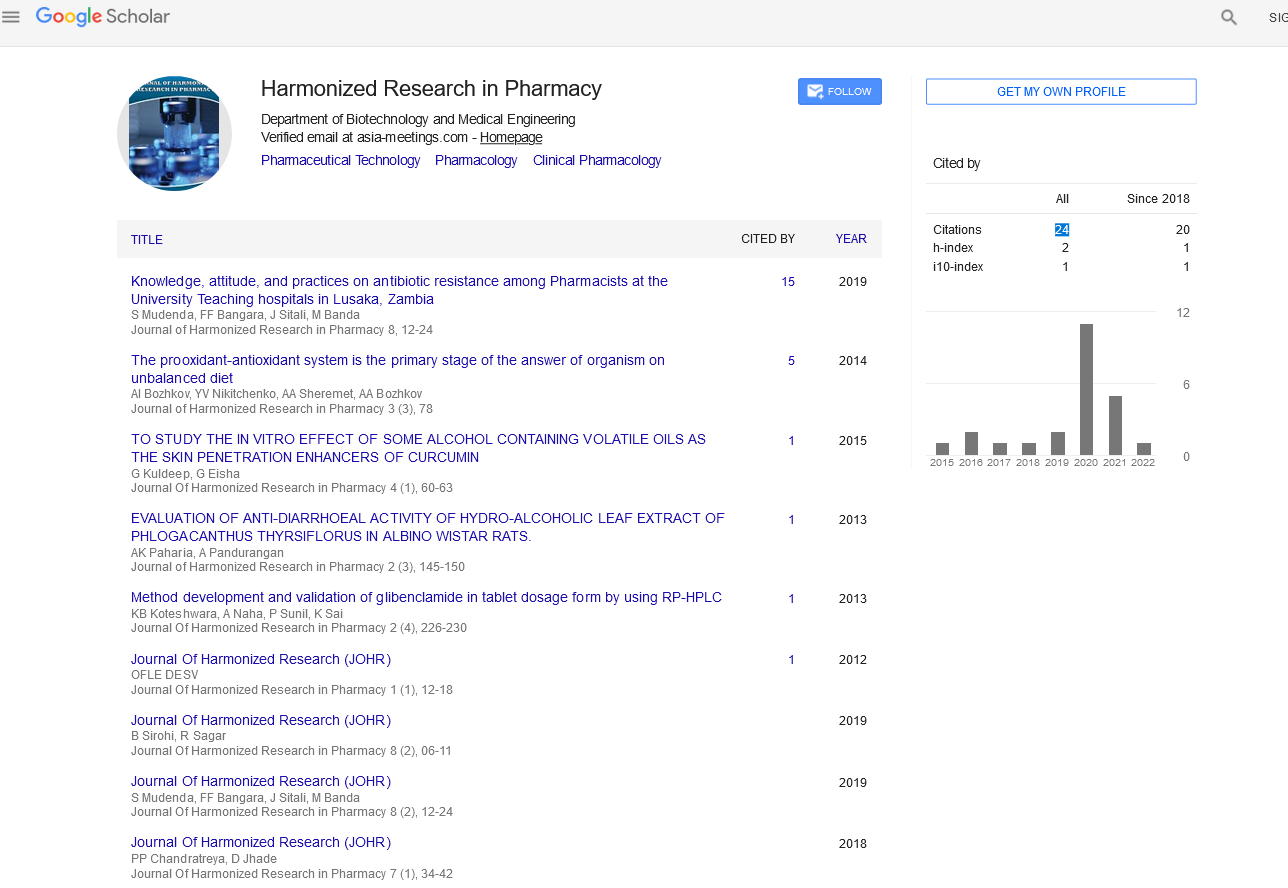Opinion Article - (2022) Volume 11, Issue 3
EXAMINING THE NEEDS FOR CLINICAL PHARMACY SERVICES IN THE TRAINING OF PHARMACISTS
Brito Hideo*Received: Sep 01, 2022, Manuscript No. JHRP-22-77703; Editor assigned: Sep 05, 2022, Pre QC No. JHRP-22-77703 (PQ); Reviewed: Sep 19, 2022, QC No. JHRP-22-77703; Revised: Sep 27, 2022, Manuscript No. JHRP-22-77703 (R); Published: Oct 05, 2022, DOI: 10.30876/2321-0958.22.11.187
Description
Pharmaceutical care is described as the provision of direct, responsible, drug-related services by pharmacists to the general public (including patients, members of the healthcare team, etc.) with the aim of enhancing the quality of life of the patients. It has gained popularity because of its positive therapeutic results and financial advantages. Physicians have a direct impact on Clinical Pharmacy Services in clinical practise (CPSs). Clinical pharmacists serve as the healthcare team’s pharmacotherapy experts, giving them the necessary knowledge. Physician support and confidence in clinical pharmacists will be fostered and their working relationship will be further developed if the demand for clinical pharmacists is made clear. A thorough understanding of the demands doctors have for clinical pharmacists can be obtained by looking into the perspectives, experiences, and expectations doctors have about the job of clinical pharmacists. Clinical pharmacists’ ability and competence to improve patient safety and support physicians’ decision-making are expectations. Experience is the acceptance of or evaluation of CPS provided by clinical pharmacists. Perception is the level of comfort with clinical pharmacists’ support of physicians’ treatment. In contrast to established nations, clinical pharmacists’ functions and work habits are still hazy in emerging nations like China, and the manner of training for clinical pharmacy talent is still in its exploration phase. The needs of physicians for clinical pharmacists should be targeted for inclusion in clinical pharmacy service systems to guide clinical pharmacist training.
China is still in the early stages of developing clinical pharmacy compared to affluent nations. The dearth of clinical pharmacists and the inadequate pharmaceutical care ability of pharmacists are two factors contributing to the delayed development of clinical pharmacy in China. As a result, improving clinical pharmacy education in China is currently a pressing concern. Clinical pharmacy undergraduate and master’s degree programmes are the fundamental foundations for training clinical pharmacy talent in China. Despite the fact that pharmacy education in China is expanding quickly, there are certain issues. For example, there are no curriculum areas that combine pharmacy and medicine, which causes a knowledge gap that, falls short of what physicians require. According to studies, the majority of physicians questioned the clinical pharmacists’ competency since they thought their pharmacy backgrounds didn’t fully satisfy clinical needs and that clinical pharmacists’ overall business competence was generally low. Investigating the needs of physicians for clinical pharmacists may be one of the key entry points for enhancing the clinical pharmacy staff training programme in China. Education should primarily serve the needs of societal development.
In China, it’s unclear what clinical pharmacists are needed for. Studies examining the perceptions, expectations, and experiences of clinical pharmacists among Chinese physicians are scarce. The majority of studies avoided a thorough examination of the demands that physicians place on clinical pharmacists in favour of theoretical discussions of the roles and skill sets that clinical pharmacists must fulfil for physicians. Some studies contain limitations regarding the accuracy of the data, sample sizes, and sample representation, and no subgroup analysis was done; as a result, they have little practical relevance for enhancing clinical pharmacist training in China. We looked into how Chinese physicians perceived clinical pharmacists from the standpoint of what doctors demanded based on the analysis above. On the basis of the findings, suggestions are made to enhance the clinical pharmacist training programme in China. This research may potentially shed important light on clinical pharmacy education in underdeveloped nations.
Clinical pharmacists are only capable of performing their customary duties, leaving little healthcare human resources to expand their involvement in providing direct patient care in collaboration with doctors. Even for simple ailments, doctors are hesitant to acknowledge clinical pharmacists’ involvement in prescribing drugs. The frequency of a physician’s interactions with a clinical pharmacist is positively correlated with the physician’s perceptions and experiences of clinical pharmacists. Clinical pharmacists are expected to be competent drug therapy experts by doctors, but at the moment, clinical pharmacists in China are unable to fulfil this job. The operational environment for clinical pharmacists should be improved, their competency should be raised, and physicians’ acceptance of them should be increased.

Google Scholar citation report
Citations : 147
Journal of Harmonized Research in Pharmacy received 147 citations as per google scholar report









